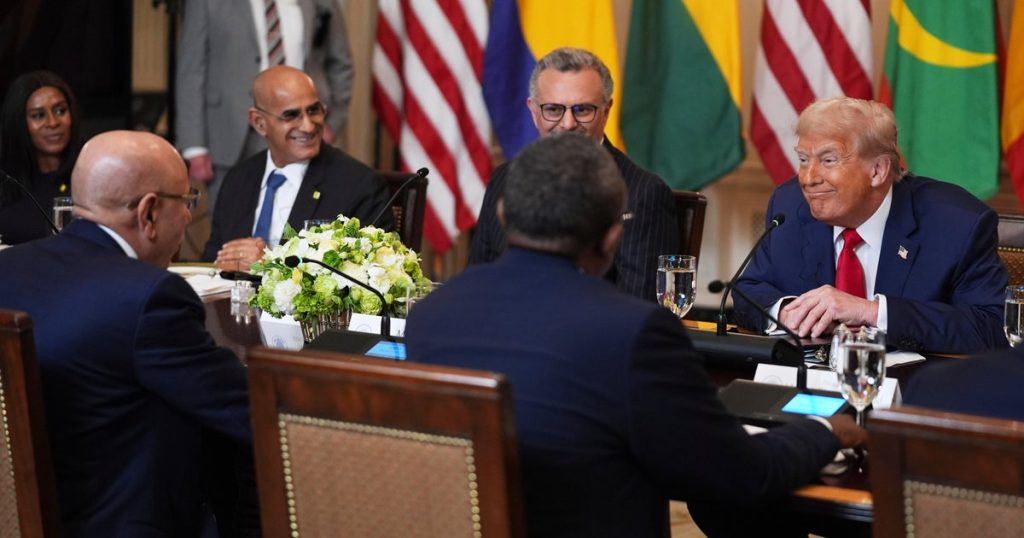In a recent White House meeting, President Trump engaged in a somewhat awkward exchange with Liberian President Joseph Boakai, praising his English-speaking skills despite English being Liberia’s official language. This interaction occurred during a lunch with several African leaders, where President Trump also commented on the linguistic abilities of his other guests. Observers noted a lack of extensive media coverage in Liberia regarding this incident, raising questions about diplomatic relations and cultural perceptions.
| Article Subheadings |
|---|
| 1) President Trump’s Praise |
| 2) The Response from President Boakai |
| 3) The Historical Context of U.S.-Liberia Relations |
| 4) Media Coverage in Liberia |
| 5) Implications for Diplomatic Relations |
President Trump’s Praise
During a scheduled lunch at the White House, President Donald Trump lauded President Boakai for his outstanding English-speaking abilities. The meeting had a gathering of African leaders, where President Trump, after brief remarks from President Boakai, expressed his surprise at the Liberian leader’s language skills. President Trump stated, “Thank you, and such good English,” to which he also inquired, “Where did you learn to speak so beautifully? Where were you educated?” Such comments could be interpreted as both a genuine compliment and a somewhat superficial acknowledgment of Liberia’s linguistic environment, where English is the predominant language.
The Response from President Boakai
In response to President Trump’s remarks, President Boakai, who has been educated in Liberia, indicated that his schooling took place in his home country. His response was somewhat muted, characterized by a mumbled tone that left more questions than clarity regarding his feelings about the interaction. Observers noted that he was facing away from the media, making it difficult to gauge his emotional reaction to Trump’s comments. This interaction emphasizes the cultural misunderstandings that can occur in diplomatic settings, particularly when one party may not appreciate the context of the language being praised.
The Historical Context of U.S.-Liberia Relations
The relationship between the United States and Liberia has deep roots, dating back to the 1820s when the U.S. Congress, influenced by the American Colonization Society, began facilitating the settlement of freed slaves in the African nation. Over the years, thousands of freed African Americans migrated to Liberia, eventually leading to the establishment of a government in 1847. This government operated under the leadership of the “Americo-Liberian” settlers, who frequently ruled over the indigenous populations. As a result, the interplay of cultural and linguistic influences in Liberia is complex, marked by the prevalence of English alongside various indigenous languages.
Media Coverage in Liberia
Perhaps most revealing was the response from the Liberian media to Trump’s remarks about President Boakai’s English skills. Major news outlets in Liberia largely omitted detailed accounts of the interaction. The website for FrontPageAfrica made no notable mention of the exchange, while the Daily Observer briefly referred to Trump’s praise as a joke. This muted media reaction could suggest a range of factors at play, including the complexity of how foreign diplomacy is viewed domestically and a potential reluctance to dwell on what is considered a trivial compliment from a controversial figure like President Trump.
Implications for Diplomatic Relations
President Trump’s comments come against a backdrop of his historically strained relationships with African nations. His previous term was marked by controversy, including remarks that referenced Africa in derogatory terms. Such incidents have contributed to a fraught perception of U.S. engagement in the region, with some African leaders expressing their concerns openly. The recent exchange with President Boakai highlights the need for careful diplomatic discourse that not only respects cultural identities but also acknowledges the historical context of U.S.-Africa relations.
| No. | Key Points |
|---|---|
| 1 | President Trump praised Liberian President Boakai for his English skills during a White House lunch. |
| 2 | President Boakai indicated he was educated in Liberia and responded to Trump’s praise rather awkwardly. |
| 3 | The exchange highlighted the complex historical relationship between the U.S. and Liberia, dating back to the 1820s. |
| 4 | Media coverage in Liberia regarding the incident was minimal, indicating a possible cultural distance from the exchange. |
| 5 | The incident reflects on broader diplomatic relations, especially given Trump’s controversial history with African nations. |
Summary
The recent interaction between President Trump and Liberian President Boakai at a White House lunch raises significant questions regarding communication, cultural nuances, and U.S.-Africa relations. Trump’s praise, though ostensibly a compliment, may further illustrate the challenges faced in diplomatic engagements. This exchange not only sheds light on the perceptions of language between the two nations but also reflects a historical context that remains relevant in understanding their relationship today.
Frequently Asked Questions
Question: What is the significance of President Trump’s comments on President Boakai’s English?
President Trump’s remarks serve as an intriguing example of cultural misunderstanding in diplomatic contexts, especially given that English is already the official language of Liberia.
Question: How is the media in Liberia reacting to the exchange?
Media coverage in Liberia has been notably sparse regarding Trump’s comments, suggesting a broader cultural complexity in the perception of foreign diplomatic engagements.
Question: What are the historical ties between the United States and Liberia?
U.S. ties to Liberia date back to the early 19th century when freed American slaves were resettled there, leading to a complex legacy of governance and cultural interaction.


